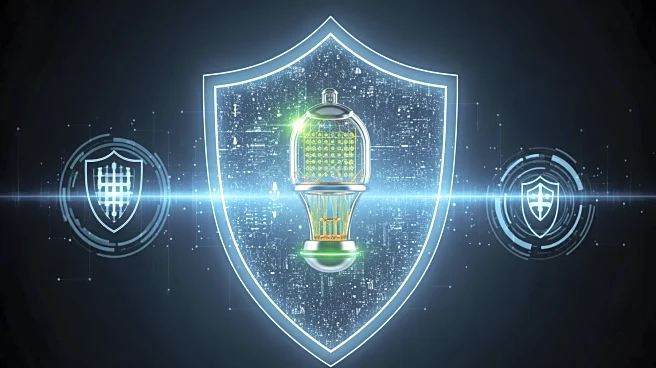What's Happening?
Researchers from institutions including the University of Padova have developed new countermeasures to enhance the security of Quantum Key Distribution (QKD) systems. QKD, which relies on the fundamental laws of physics rather than computational complexity,
is considered highly secure for exchanging cryptographic keys. However, it is vulnerable to Trojan-Horse attacks, where eavesdroppers inject light to analyze reflected signals. The research team focused on vulnerabilities in the iPOGNAC encoder, proposing methods to mitigate these attacks. Their work includes improving detector calibration, compensation, and data post-processing techniques to filter out malicious signals. The study also explores the theoretical limits of information extraction by eavesdroppers, bounded by the Holevo bound and Von Neumann entropy, and evaluates the effectiveness of countermeasures in maintaining low quantum bit error rates.
Why It's Important?
The development of these countermeasures is crucial as QKD systems are increasingly vital for secure global communication networks. As conventional encryption methods face growing threats, ensuring the security of QKD systems is paramount. The research provides a significant step towards addressing potential weaknesses in QKD components, offering a robust defense against Trojan-Horse attacks. This advancement not only enhances the security of QKD systems but also contributes to the broader field of secure communication, potentially benefiting industries reliant on secure data transmission. By improving the resilience of QKD systems, the research supports the development of a truly secure global communication network, which is essential for protecting sensitive information in various sectors.
What's Next?
Future work could explore the effectiveness of these countermeasures against more sophisticated attack strategies and investigate the impact of imperfections in real-world components. The researchers suggest that a modest increase in attenuation, alongside the addition of an isolator, can significantly enhance security. This ongoing research will likely continue to refine QKD systems, ensuring they remain a viable solution for secure communication in the face of evolving threats. As the technology matures, it may see broader adoption across industries that require high levels of data security.
Beyond the Headlines
The research highlights the importance of addressing practical vulnerabilities in QKD systems, which are often overlooked in theoretical security proofs. By focusing on real-world detector limitations and developing practical countermeasures, the study bridges the gap between theoretical and applied quantum security. This approach not only strengthens QKD systems but also sets a precedent for future research in quantum communication, emphasizing the need for comprehensive security assessments that consider both theoretical and practical aspects.

















